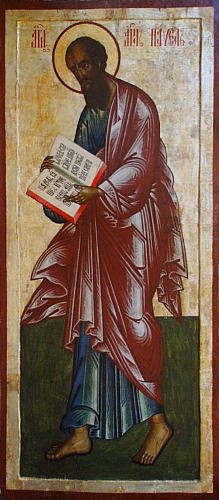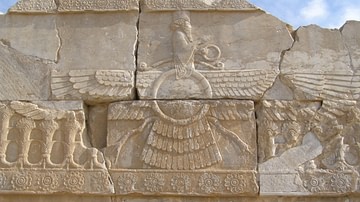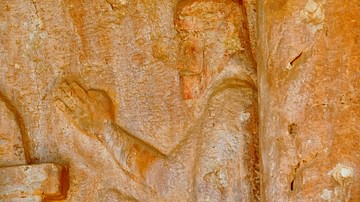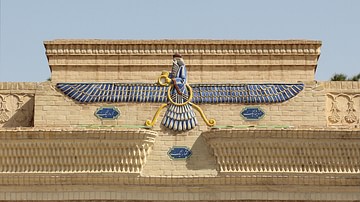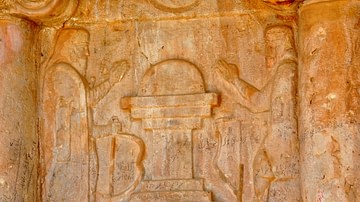Monotheism is simply defined as the belief in one god and is usually positioned as the polar opposite of polytheism, the belief in many gods. However, the word monotheism is a relatively modern one that was coined in the mid-17th century CE by the British philosopher Henry More (1614-1687 CE). It comes from the Greek words, monos (single) and theos (god). In the Western tradition, this 'belief in one god' specifically refers to the God of the Bible; the God of Judaism, Christianity, and Islam (and always written with a capital G). However, in the ancient world, the concept of monotheism as we understand it today did not exist; all ancient people were polytheists. They may have elevated one god as higher than the others (henotheism) but nevertheless recognized the existence of divine multiplicity.
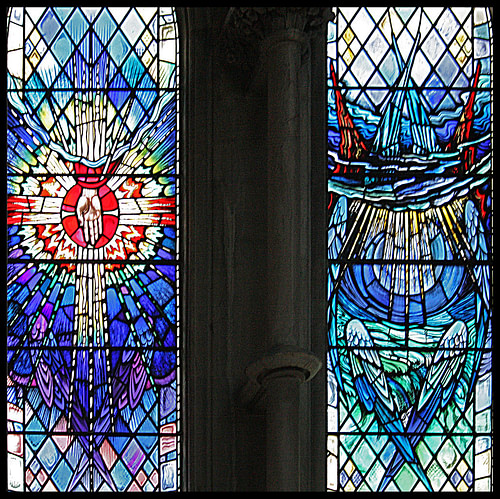
The concept of the universe for the ancients consisted of three realms: the sky (the heavens); earth (humans); and the underworld (sometimes known as the netherworld or simply 'the land of the dead'). The sky was the domain of the gods and was crowded with a host of divinities understood in a gradient of powers. Many ancient civilizations had a dominant god, or a king of the gods, with other divinities being in charge of various aspects of life, serving as a court of advisers, or simply as messengers to humans below. Many of these powers could transcend (cross over) to the earth below in various manifestations. They could also travel to the underworld, and in those manifestations were known as chthonic (underworld powers). Some of the lesser deities, known as daemons, came to be perceived as evil over time (demons). These powers were believed to be able to possess people and functioned as an explanation for diseases and mental disorders.
Belief, Faith, & Creed
The modern concept of monotheism also assumes two other concepts, that of 'belief' and 'faith.' The problem in understanding religions in antiquity is not that they did not believe in things or that they lacked faith in the gods and goddesses. However, this was not often articulated or manifest in the same way that we now assume in our religious systems. Unlike the later creeds of Christianity, there was no comparable creed in the various ethnic cults in the Mediterranean basin.
The closest equivalent of shared knowledge was found in the works of Homer (Iliad; Odyssey) Hesiod (Theogony; Works and Days) and the myths of the bards as the basis of stories of creation and the gods and heroes. There was no central authority (like the Vatican) to dictate conformity of beliefs and practices. Each ethnic group developed rituals and practices necessary for worship (consisting of sacrifices) that was passed down to their ancestors from the gods. It was crucially important to carry out these rituals without mistakes.
Ancient Roots of Monotheism
While the term monotheism itself is modern, scholars have attempted to uncover ancient roots of monotheistic beliefs in the ancient world. High on the list is the Egyptian pharaoh Akhenaten (1353-1336 BCE), often referred to as the first monotheist. During the Amarna Period, Akhenaten promoted the worship of Aten, the symbol of the sun, as the highest form of worship, and eliminated the worship of Amon-Ra at Luxor, who was the dominant god at the time. However, the attempt to destroy the temples, images, and priesthood of Amon-Ra nevertheless would indicate a belief in this god's existence (and influence). At the same time, there is no evidence that Akhenaten also persecuted or attempted to eliminate the other gods/goddesses of Egyptian religion, nor did he attempt to eliminate the numerous religious festivals or afterlife beliefs throughout Egypt.
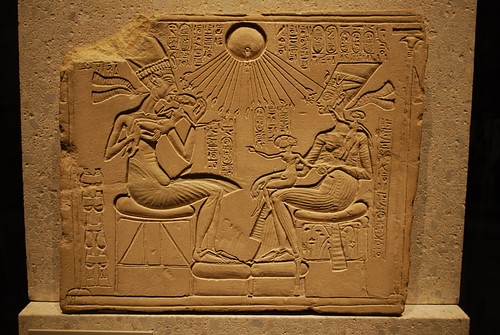
Another source for the roots of ancient monotheism can be found in Zoroastrianism which became the state cult of ancient Persia. Zoroaster was a prophet (with dates anywhere from 1000-600 BCE) who promoted the worship of one supreme deity, Ahura Mazda, who was the creator of everything in the universe. Nevertheless, Ahura Mazda emanated six primary Amesha Spentas (spiritual forces) as well as other Yazatas (abstract powers) who were in polar opposition to other forces (e.g. truth vs. evil thinking). The extreme opposite of Ahura Mazda was druj, or 'chaos,' personified as Angra Mainyu. As such, the existence of a power opposed to all creation eventually gave rise to later Jewish, Christian, and Islamic concepts of the 'Devil.' Despite the extremes of pure good vs. pure evil (or the concept known as dualism), modern Zoroastrians claim that they are the true originators of monotheism, as everything arose from 'the one.'
Ancient Judaism continues to receive the most attention as creating the origins of monotheism in the Western tradition. More recently some scholars are applying the term 'monolatry,' a system that recognizes the existence of other gods, but chooses to worship only one. Like their neighbors, ancient Jews conceived of a hierarchy of powers in heaven: “sons of god” (Genesis 6), angels, archangels (the messengers from God who communicate God's will to humans), cherubim and seraphim. Jews also recognized the existence of demons with many examples in the ministry of Jesus in the gospels in his role as an exorcist.
Scholars have perennially attempted to analyze Genesis 1:26: "Then God said, 'let us make man in our image, in our likeness. . . '" Who is God talking to? Is the "our" the same as the "royal we?" Suggestions have included the ancient and comparable ideas in ancient cultures that the heavens reflected societal structures on earth; kings usually had a court of advisers and thus there was a heavenly court as well.
The foundational story for the idea that Jews were monotheistic is when Moses receives the commandments of God on Mt. Sinai: "I am the Lord your God . . . You shall have no other gods before me." The Hebrew could actually be translated as "no other gods beside me." This does not indicate that other gods do not exist; it is a commandment that the Jews were not to worship any other gods. Worship in the ancient world always meant sacrifices. Jews could pray to angels and other powers in heaven, but they were only to offer sacrifices to the god of Israel.
The Jewish Scriptures consistently refer to the existence of the gods of the nations (ethnic groups): Deuteronomy 6:14 ("do not follow other gods"); 29:18 ("to serve the gods of those nations"); 32:43 ("Praise O heavens, his people, worship him all you gods!"); Isaiah 36:20 ("who among all of the gods of these nations have saved their nations?"); Psalm 821 ("God presides in the great assembly; he renders judgment among the gods"). In the story of the Jews' Exodus from Egypt, God battles against the gods of Egypt to demonstrate who controls nature. This makes little sense if their existence was not recognized: ". . . I will bring judgment on all the gods of Egypt." (Exodus 12:12)
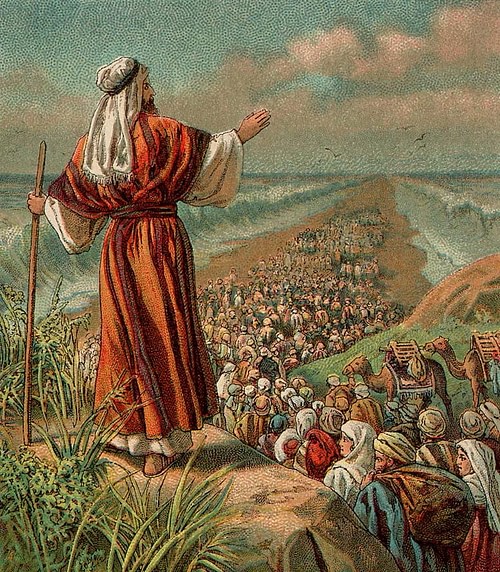
While Jews only offered sacrifices to the god of Israel, they shared a common conviction that all the gods should be respected; it was perilous to anger the other gods. Exodus 22:28 ordered the Jews never to revile the gods of the nations. With the destruction of the Jewish Temple in Jerusalem by the Romans in 70 CE, cultic sacrifices were no longer possible. The later leaders of Judaism, the Rabbis, began a long process of reinterpreting worship as a focus on the "one," which would lead to the eventual concept of the existence of only one god in the universe.
Under the persecution by the Seleucid Greeks (which resulted in the Maccabean Revolt in 167 BCE), those who died for refusing to worship the Greek gods were believed to be rewarded by instantly being transported to god in heaven, as martyrs ('witnesses').
Philosophical Monotheism
With the emergence of schools of Greek philosophy c. 600 BCE in Miletus, philosophical speculation concerning the universe and humans' place in it began to spread throughout the Mediterranean basin. Many philosophers gathered students around them (disciples), and it was these students who often wrote down the teachings and passed them on to the next generation. Philosophy was also associated with the upper classes, as only the rich had time and leisure to devote to this form of higher education. Not simply an ivory tower speculation, philosophy, like ancient religion, taught a way of life, offering its own moral and spiritual interpretations.
The schools of Plato, Aristotle, and the Stoics taught ways in which to cope with the vagaries of life, more concerned with the state of one's soul than with worldly externals. A focus was on how the soul could return to its origins in the higher realm after death, reuniting with the "most high god." For Plato, this high god was uncreated, immutable (not subject to change), and pure essence (not matter and therefore not subject to decay). Through the device of allegory, abstracts of reality emanated from the mind of god, like light from a candle. This god also emanated the logos, or the principle of rationality, to order the physical world.
Aristotle (384-322 BCE) dealt with metaphysics or the existence of first principles. The highest god is the first of all substances, the "unmoved mover," causing the motion of the spheres, the planets. For the Stoics, the universe was a single organism energized by an imminent, divine rational force which ordered the universe according to natural law. They taught that all should live a life of accepting both good and evil, disciplining oneself to ultimately attain harmony with this divine force.
Many schools critiqued traditional Greek mythology and its anthropomorphism (assigning human characteristics to the gods), although very few condemned traditional sacrifices outright or called for an elimination of traditional rituals. Through their writings, philosophy contributed to the eventual views of monotheism for both Christian theologians and the later Rabbis.
Christianity
Our earliest evidence for Christian communities, the letters of Paul (c. 50-60 CE), demonstrate the same Jewish recognition in the powers of the universe. Many manifestations of the divine were accepted in the same gradients of power, but only the god of Israel was to be worshipped: "Even though there may be so-called gods in heaven or on earth—as in fact there are many lords—yet for us there is one god, the Father" (1 Corinthians 8:5). Paul often railed against the others' gods who impeded his mission (2 Corinthians 4:4). Their existence was real.
However, early Christianity became complicated in relation to the concept of one god when a new concept was introduced. From the very beginning (in the post-Easter experiences of the Apostles), Christians began to claim that along with Jesus's resurrection from the dead, he had also been "exalted" to heaven and given a seat "at the right hand of god" (Acts 7:56). 1 Peter 3:21-22 states that: "It [baptism] saves you by the resurrection of Jesus Christ, who has gone into heaven and is at the right hand of god, with angels, authorities, and powers made subject to him."
Until the destruction of the Temple in Jerusalem, the first followers of Jesus were in accord with the Jewish dictate that sacrifices could only be offered to the god of Israel. We also know that these early followers began including other elements of worship in relation to Jesus: baptizing people in the name of Jesus; curing and driving out demons in his name; expanding upon the concept of forgiving sins in his name; prayers and hymns directed to Jesus.
An early hymn recited by Paul is found in Phil. 2:9-11:
Who, being in the very nature god, did not consider equality with god something to be used to his own advantage; rather, he made himself nothing by taking the very nature of a servant, being made in human likeness. And being found in appearance as a man, he humbled himself by becoming obedient to death—even death on a cross! Therefore, god also highly exalted him and gave him the name that is above every name, so that at the name of Jesus every knee should bend, in heaven and on earth and under the earth, and every tongue should confess that Jesus Christ is Lord, to the glory of god the father.
That "every knee should bend" meant worship, in an age-old concept of bowing down before images of various gods. The idea that Jesus pre-existed in heaven before being manifest as a human on earth was reinforced in the Gospel of John, where he begins by claiming that Jesus was the logos who took on flesh to teach us about God and salvation. This idea was later canonized as the Incarnation of Jesus.
The Road to the Trinity
When ex-pagans converted to Christianity, they adopted the Jewish concept of refusing to worship the other gods. This led to persecution as such a refusal was understood as treason to the Roman Empire; not placating the gods meant that you did not want the Empire to prosper and could bring disaster. Treason was always a capital offense, and so Christians were executed in the arenas.
Many Christian writers appealed to the emperors that they should be given the same exception to the traditional sacrifices that had been given to the Jews (during the reign of Julius Caesar). Christians claimed that they were the 'true Jews,' and not a new religion, using allegory to demonstrate that they had ancient ties through the Jewish Scriptures. They argued that everywhere that God was mentioned, it was actually a form of the pre-existent Christ. Technically, then, like the Jews, they only worshipped one god. Rome always responded that Christians were not circumcised and therefore, not Jews.
In 312 CE, Emperor Constantine became a Christian and legalized Christianity so that persecution ceased. However, Christian thinkers still debated the relationship between God and Jesus. An elder in the church at Alexandria, Arius began teaching that if God created everything in the universe, then at some point in time, he must have created Christ. This meant that Christ was subordinate to God. Riots arose over this in Alexandria and other cities of the Empire.
The First Council of Nicaea assembled to settle the matter; they decided that God and Christ were identical in substance and that Christ was a manifestation of God himself on earth:
We believe in one god, the Father, the Almighty, maker of heaven and earth, of all that is seen and unseen. We believe in one Lord, Jesus Christ, the only Son of God, eternally begotten of the Father, God from God, Light from Light, true God from true God, begotten, not made, one in Being with the Father. Through him all things were made. For us men and for our salvation he came down from heaven: by the power of the Holy Spirit he was born of the Virgin Mary and became man . . . We believe in the Holy Spirit, the Lord, the giver of life, who proceeds from the Father and the Son. With the Father and the Son he is worshipped and glorified.
The creed was revised several times over the next decades and a shortened version became popular and is commonly known as the Apostles' Creed. The concept of the Trinity claims that God remains one, but with three manifestations or personas: God, Christ, and the Holy Spirit.
Absorbing ideas from both Judaism and Greek hero cults, Christians began meeting at the tombs of martyrs to petition them in prayer. The rise of the cult of the saints combined Jewish martyrdom and ancient Greek hero cults where people would gather at the tombs of the hero. The Greco-Roman concept of patron gods/goddesses of a particular ethnic group or town was absorbed into Christian patron saints in heaven who became mediators between humans and God.
Islam
In the 6th century CE, a prophet arose in Saudi Arabia, Mohammad, who became the founder of Islam. He was essentially a reformer, claiming that both Judaism and Christianity had become corrupted by false teaching. Utilizing the Jewish Scriptures, he emphasized the oneness of God (Allah); combining Allah with any other power is considered 'shirk,' equivalent to idolatry. Nevertheless, Islam does recognize gradients of powers.
God created three intelligent types of beings: angels, jinn (the equivalent of demons), and humans. Angels did not have free will (they are pure reason) and therefore cannot sin, but jinn and humans can choose between good and evil. When God created Adam, he ordered all the angels to bow down to him. One angel, Iblis (Shaytan, the Devil), refused to do so and was cast down to Hell. He was given permission by God to tempt humans, but his authority would ultimately be destroyed on the Day of Judgment.
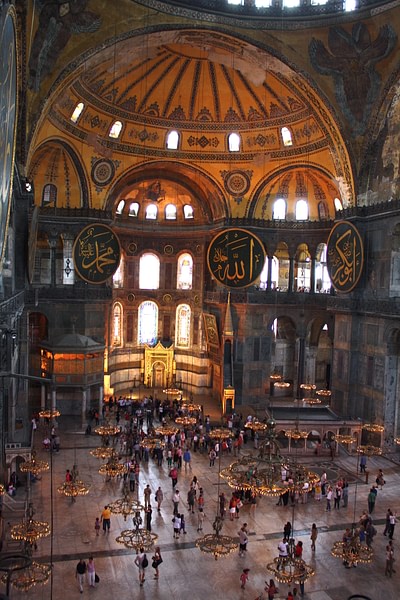
After the death of Muhammad, his followers split into two major groups over the succession. Those who supported his son-in-law, Ali, became the Shi'ites, while the majority are known as Sunnis. Shi'ites honor their great teachers, imams, with the same kind of pilgrimage and rituals at their tombs. Sunnis claim that this is equivalent to the Christian veneration of saints and compromises the oneness of God.
Over the centuries, many elements contributed to what would eventually become the modern, Western conception of monotheism. The paradox is found in proclaiming God as one and yet perceiving that God is not alone.


